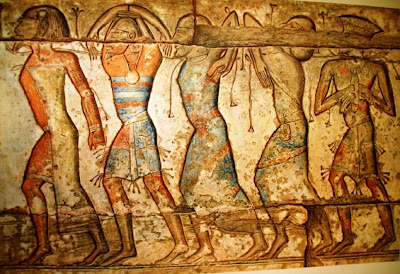WoW and Equality in the Public Sphere
 |
| Photo by Emil Salman / Ha'aretz |
Again, I believe this is the primary issue, and that even though there are many other places where WoW might be concerned about discrimination taking place in the public sphere, they are focusing specifically on the Western Wall/Kotel. (Indeed WoW is affiliated ideologically - though not formally so far as I know - with IRAC, which deals regularly with many other forms of perceived discrimination).
The claim of discrimination might be described as follows: The Western Wall is a national heritage site, a public space under the auspices of the State of Israel. (The State officially controls the Kotel and adjacent plaza, although since 1988, it does so via an oversight body called the Western Wall Heritage Foundation.) Since the Kotel is a public, government-controlled space, WoW argues that it is necessary for all people - regardless of religious affiliation or gender - to have equal access to this space; otherwise it's discrimination. (At least that would be my understanding of their argument. If I'm putting words into anyone's mouths, please feel free to correct me!)
Now let's define "access." Because if you've been to the Kotel you know that anyone - regardless of religion, race, nationality, gender, etc. - can go to the Kotel. True, the men's section is larger than the women's section. True, it's a gender-separate space. But for the sake of focus let's leave those issues aside for the moment. All individuals have equal access to the Kotel itself, and in that sense there is no discrimination.
But let's get to the sticking points, the issues which we need to discuss in terms of whether they constitute discrimination. These include: 1) Individuals being denied entrance to the Kotel based on dress. 2) Groups (and in particular, prayer quorums) being denied access to the Kotel insofar as praying there as a group.
Regarding number one, perhaps there is a question about whether a requirement for "modest attire" in a public space constitutes discrimination. But again, let's leave that aside and focus specifically on the issues with which WoW is most concerned. I'm honestly not clear as to what the official law is at present, but there was - and may still be - a law prohibiting women from wearing a Tallit (prayer shawl) at the Western Wall. And it's argued that this is a form of discrimination - a combination of gender-based and religious-based discrimination.
As far as number two above, WoW is a women's prayer group, and they are calling for equal access in terms of conducting a prayer service in the manner they choose. Now it happens that WoW defends its prayer service as falling within the bounds of Halacha (Jewish Law). But it seems to me that this fact is unrelated to the question of discrimination. Even if they were self-stated as not following Halacha, and they were denied the ability to pray as a group in the manner they wanted, this would conceivably constitute discrimination. And for that matter, to deny any prayer group representing any religion access to the Kotel would also count as discrimination.
Okay - I know that long posts start to have diminishing returns in terms of keeping people's attention, so let me end with a few questions:
- Do points one and two above constitute discrimination?
- Are there other factors which mitigate/compete with discrimination - e.g. status quo arguments about current customs at the Kotel, or groups which either purposely or by no fault of their own create a public disturbance?
- Where do we draw the line regarding religious groups praying at the Kotel? Are we saying that the Pope should be able to come and conduct a mass at the Kotel? (I'm being serious, not facetious.)
- And if we decide that it's legal to favor a religious group or discriminate by gender in the public sphere (even in limited cases such as the Kotel), who gets to decide where that line is drawn?
- Do we want the State of Israel to be a place where there is equal access to both genders and all religions in the public sphere, or do we want it to be Jewish in some manner that could be called "traditional"? What direction do we want to head in?



Comments
Post a Comment
Not sure how to leave a comment? By "Comment as", either choose your Google ID, OR select "Name/URL". Type your name and leave URL blank (if you don't have a web address). Then hit "Publish", type in the letters/number shown, and again "Publish". I don't mind anonymous comments, but please use a pseudonym.